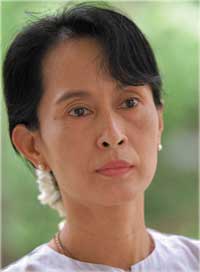The United States slammed the Burmese junta yesterday for gross violations of human rights and said it would use multilateral avenues to put pressure on the government. The condition in the country with regard to human rights has deteriorated, it said. Assistant Secretary of State for Democracy, Human Rights and Labor, Barry F Lowenkron, right, told reporters: “I want to use all the multilateral tools to press for fundamental change in Burma and for the freedom of Aung San Suu Kyi, for her demands, for her requests to open up a dialogue.” (07-MAR-07)
Written by Lalit K Jha and first published in today´s issue of Irrawaddy, this article has been edited for republication here by HRHF / Niels Jacob Harbitz. Putting Burma among the top violators of human rights in its annual report on human rights for the year 2006, the US Department of State said the military government extensively uses executions, rape, torture, arbitrary detention and forced relocation of entire villages, particularly of ethnic minorities, to maintain its hold on power. The Norwegian Burma Committee, left, refers to the report in its most recent newsletter.
Putting Burma among the top violators of human rights in its annual report on human rights for the year 2006, the US Department of State said the military government extensively uses executions, rape, torture, arbitrary detention and forced relocation of entire villages, particularly of ethnic minorities, to maintain its hold on power. The Norwegian Burma Committee, left, refers to the report in its most recent newsletter.
-I want to use all multilateral tools
Soon after the report was released by Secretary of State Condoleezza Rice in Washington, the Assistant Secretary of State for Democracy, Human Rights and Labor, Barry F Lowenkron, told reporters: “I want to use all the multilateral tools to press for fundamental change in Burma and for the freedom of Aung San Suu Kyi, for her demands, for her requests to open up a dialogue.” Nobel Peace Laureate and opposition leader Suu Kyi has been under house arrest for more than 11 of the past 17 years.
 -Harsh, life-threatening conditions
-Harsh, life-threatening conditions
The report gives an extensive account on human rights violations by the military junta. “The regime´s cruel and destructive misrule also resulted in refugee outflows, the spread of infectious diseases and the trafficking of drugs and human beings into neighboring countries,” it said. The report documents in detail the alleged atrocities against the people of Burma by the junta, concluding that the government´s human rights record “worsened” during the year. The regime continued to abridge the right of citizens to change their government, it said. According to the report, prisoners and detainees were routinely subjected to abuse. They are held in harsh, life-threatening conditions. Surveillance, harassment and imprisonment of political activists continued; Suu Kyi, left, remained incommunicado under house arrest and more than 1,100 political prisoners languished in prisons, it said.
-Domestic NGOs cannot function independently
“The use of forced labor, trafficking in persons, conscription of child soldiers and religious discrimination remained widespread. The government reconvened the sham National Convention, handpicking delegates and prohibiting free debate. Touted as part of a ´democracy road map,´ the convention was designed to nullify the results of the 1990 election and adopt a new, regime-friendly constitution,” the report said. “The government did not allow domestic human rights non-governmental organizations to function independently and international NGOs encountered a hostile environment,” the report said. The report said the junta refused to allow the International Committee of the Red Cross to visit prisoners privately, and the Burmese army had increased attacks on ethnic minority villagers in Pegu Division and Karen State, designed to drive them from their homes.





